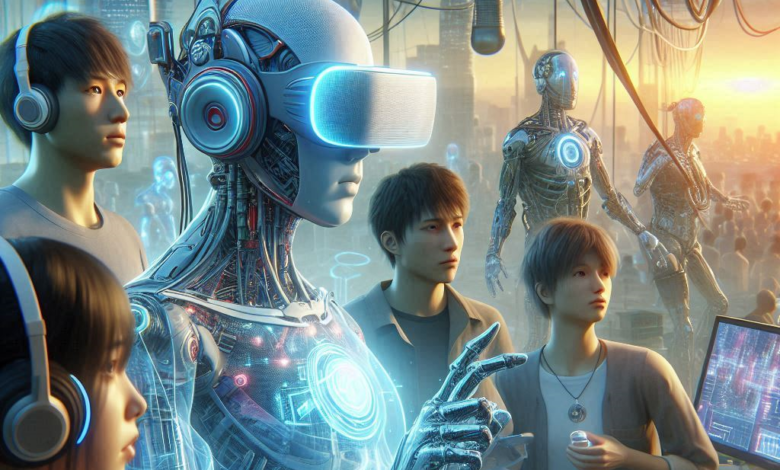AI-Powered NPCs in Realistic VR Worlds

Virtual reality is fantastic in its ability to take the player from one world to another. It can take them into quite different worlds simulating reality or, more accurately, stretching beyond what human minds can imagine. Among the important building blocks of these experiences is the application of non-player characters that may behave believably within their virtual settings. With AI advancement, NPCs are no longer confined within the prison of a prewritten script and answers. Instead, AI-led NPCs lead dynamic interactions that give more vibrancy and lifelike experiences within the world of VR by responding to the players’ actions in a more realistic and life-like manner.
AI app development makes a deep impact on VR NPCs. AI algorithms turn NPCs into creatures that learn and make decisions based on the player’s activity. Such capabilities give rise to complex, living game experiences where NPCs may recall previous interactions, develop unique personalities, or even interact with complex stimuli in their environment. The task for a game developer is to take advantage of AI-powered NPCs to transcend the walls of functional roles and become engaged storytelling.
- Adaptive NPC behavior for more realistic game play
However, one of the most convincing NPCs would be those which can adapt according to the behaviors of the players. In that context, by introducing AI algorithms and neuronal networks, developers can have good NPCs responding both verbally and physically in the right context. Therefore, a virtual shopkeeper in a virtual reality world may remember a player’s previous purchases or even become suspicious if a player has some history of theft in the game. Such an adaptive behavior makes an NPC feel alive, hence more meaningful and more immersive player experiences.
The creation of adaptive behavior requires advanced AI models that could process and analyze huge amounts of data in real time, ranging from tracing the player’s decision-making pattern to subtle nuances of the way a player interacts. With the help of AI app development, developers will be equipped with tools and frameworks that will allow complex NPC behaviors, making ordinary character encounters memorable and personalized.
- Emotional Intelligence and NPCs
To fully immerse players in VR environments, NPCs must be emotionally intelligent. They need to be dynamic characters rather than mere static characters, portraying varied emotions and reacting organically according to the situational inputs. Advanced sentiment analysis and natural language processing algorithms will enable understanding and responses by NPCs into the tone, word usage, and body language used by the players.
Imagine an NPC companion getting worried when you are injured or cheering in victory over challenging battles. Emotional depth brought to NPCs allows developers to create compelling stories that affect the players emotionally. Such developments will lead towards VR games where the line between reality and fiction no longer exists, letting a player attach and invest in virtual worlds.
- Constructing Realistic Dialogue Systems
While dialogue does turn out to be an integral part of the interaction with NPCs, AI-driven systems in dialogue are changing the future of players interacting with the characters of VR games. The traditional forms of NPC dialogues have often been limited to simple branching dialogue trees resulting in predictable, repetitive conversations. With AI-driven natural language processing, NPCs can generate even more fluid, organic conversations with players.
Developing immersive NPC dialogue systems is actually where the real opportunities for money-making apps in the world of VR lie for developers. This is because people just want experiences that enable them to communicate with virtual characters in a more natural way, and AI-driven dialogue can deliver that. In this regard, the ability of NPCs to understand inputs from a player in the broadest sense of the word can engender a level of immersion that will help differentiate a VR game from its competitors, and, therefore, make it a highly marketable product.
- Complex Social Interactions
AI-driven NPCs can be used to mimic complex social interactions within a virtual world. NPCs can be programmed with motivations, relationships, and social hierarchies; it will create environments where the characters interact with one another and react to the player’s actions in the game world. An NPC community could change opinion of a player due to reputation or behavior in the game world.
The level of complexity brings in a very good sense of believability that makes the immersive worlds of VR truly realistic and makes room for game ideas to center on social strategies and interpersonal challenges. Ranging from political intrigue to factional alliances, AI-driven NPCs add depth to the narratives of games and motivate the players to explore a whole range of social interaction in virtual environments.
- AI-Driven NPCs in Combat Scenarios
Combat-themed VR games most of the time take the assistance of NPCs to develop battles that may feel challenging and immersive. AI-enabled NPCs can be aware of how players move around, counter strategies, and even predict what the player may do next. This is one way an unpredictable game with a character who is emotionally charged would leave a player on the edge all the time.
Combining AI-driven combat NPCs is a delicate balance between challenge and fairness. Predictable ones get so boring, yet overwhelming ones can be frustrating to the player. Advanced AI techniques would let outsourced game development teams build complex NPCs whose behavior in combat was much more dynamic and time adaptively real-time to the skill level of the player. This means battles would be enjoyable and rewarding without becoming too overwhelming, hence offering a much better gaming experience.
One of the major strengths of AI-powered NPCs is learning from player behavior. Using machine learning algorithms, NPCs can analyze player behavior and interactions with him as well as the game world. This enables developers to create NPCs that change strategies, personalities, or even story arcs because of the playstyle of each player.
For example, an NPC will become much less likely to leap into the battle lion’s jaws if a player charges in recklessly all the time or much more cooperative when the player plays it too safe and cautious. Such dynamic interactions afford an unmatched immersion and replayability experience, and VR games are thus more appealing to a more diverse range of players. This flexibility, then, which stems from the creation of AI applications, gives developers the chance always to refine and evolve their game, keeping players interested in the long run.
- More than Gaming
AI-powered NPCs are very much attached to gaming, but the extent of their applications is more extensive and carries far more significant implications than just playing games. Intelligent, lifelike NPCs responding to user needs may be very valuable additions to virtual training simulations, educational platforms, and even therapy programs. For example, a virtual tutor might introduce a student to intricate problems, adapting the style as relevant to the student’s progress.
Such an approach will help in regard to creating significant effects for VR NPCs in education and the health sectors. By collaborating with outsourced game development teams who have experience in applying AI and VR technologies, developers can work towards solutions that enhance learning, training, and personal development through simulations, but in ways much more extensive than typical gaming.
- Ethical Considerations by AI NPCs
As NPCs become more complex and lifelike, ethics kicks in. Developers start to face questions of player privacy and consent and even manipulating behavior. An NPC that learns from its players and adapts to them may unwittingly create situations where the player feels coerced, misled, or emotionally manipulated.
To reduce these risks, developers should focus on transparency and even ethical design norms. The VR games can balance immersion with a sense of responsibility in ethics by establishing clear guidelines for the actions of NPCs and enabling the player to have control over interactions. Doing so, it guards not only the well-being of players but also creates trust and loyalty among game-playing communities.
- AI and Creativity in NPC
Using AI to expand the role of NPC ‘s beyond simple reactivity into creative scope in the game world. Consider unique art piece crafting or generating music within the game-it’s the creativity from AI -new ways of playing in virtual environments that are not yet even conceived of by humans at this point in history. Then actors would collaborate to design buildings, solve complex puzzles, or even act out role-playing scenarios, being creative without prompts.
This shows for developers that want to make money on mobile applications: creative, AI-driven NPCs would offer players near-endless replay experiences that bring user-generated content and foster strong communities around their games. AI creativity and player collaboration creates an evolving game world which continues surprising players while continuously delighting them.
- Creating the VR Worlds of Tomorrow
A defining change in the development of AI-driven NPCs in VR games is indicative of how virtual worlds are thought of and conceived. Learning and adaptive NPCs can communicate emotionally and socially with human beings, which makes the surroundings more authentic and rich. AI app development opens the opportunities of extending the frontiers of storytelling, gameplay, and player engagement.
Far from it, though, as visions to the future become bright once more: clearly, AI-driven NPCs are going to take roles bigger and better than their current extensions. Grand promises of deeply personal narrative or grand social simulation have ‘redefined what’s possible’ in virtual reality-lit VR as they stay as immersive and transformative as they can be. The challenge and opportunity, therefore, come for developers and outsourced game development partners alike in fully realizing this potential: worlds where every NPC interaction feels as meaningful and engaging as the players themselves.




